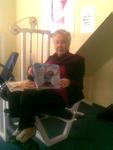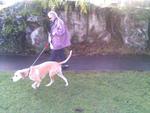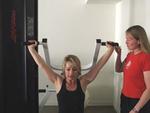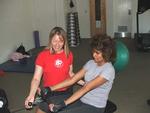| Never too late! I told Mum its never too late to start weight training. I think she has this weird idea she has to do olympic weight lifting with huge weights and she'll get all bulky. She even thought she was going to get big just by having that one protein shake I gave her!!! MUM!!!!!! All that she, and any other girls/ladies out there would need to do, is 3 days a week of circuit style weight training alternating upper and lower body exercises. It doesn't have to be super heavy to start with, 3 sets each of 12-15 reps is plenty for your first month. Then with each month try to push a little more so you continually get stronger. |
 Hopefully Mum will actually use the extension machine instead of just resting on it next time! |
" Numerous studies demonstrate strength training's ability to increase bone mass, especially spinal bone mass. According to Keeton, a research study by Ontario's McMaster University found that a year-long strength training program increased the spinal bone mass of postmenopausal women by nine percent. Furthermore, women who do not participate in strength training actually experience a decrease in bone density.
In Prescription Alternatives, Professor Earl Mindell and Virginia Hopkins detail these findings: "In a recent study on bone density and exercise, older women who did high-intensity weight training two days per week for a year were able to increase their bone density by one percent, while a control group of women who did not exercise had a bone density decrease of 1.8 to 2.5 percent. The women who exercised also had improved muscle strength and better balance, while both decreased in the non-exercising group." |
|

The fitness site for today's active figures!
Monday, June 16, 2025




